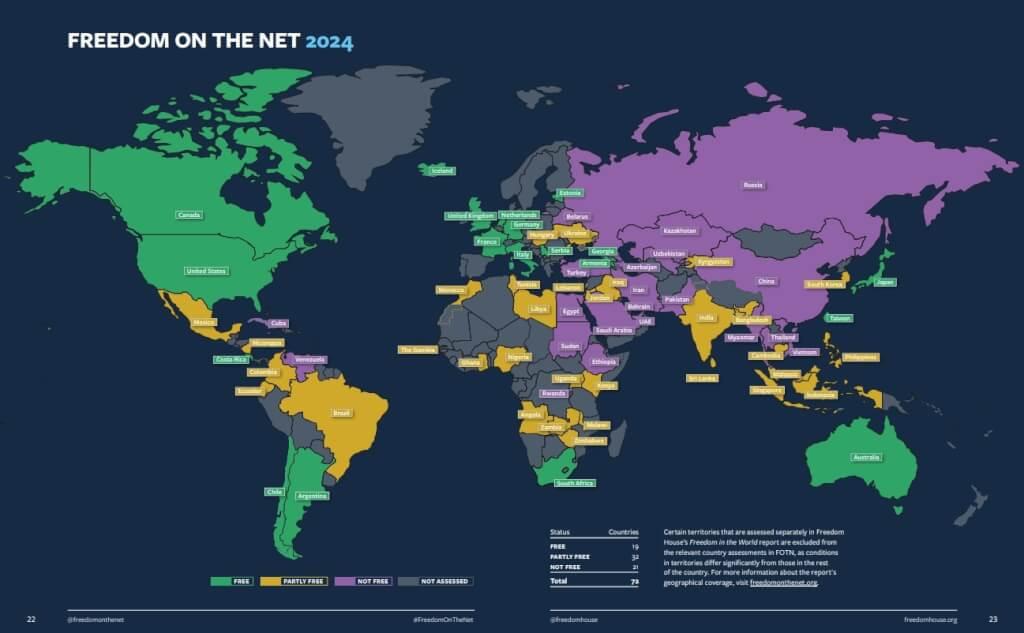Taiwan had the freest Internet in Asia in this year’s Freedom on the Net report, and the seventh freest globally.
Freedom House today published its annual report on Internet freedom in 72 countries worldwide.
With a total score of 79 out of 100, Taiwan’s Internet was considered “free” by the Washington-based research nonprofit, which is funded by the US Congress, but run independently.

Photo courtesy of Freedom House
The report praised Taiwan’s efforts to combat misinformation in the lead-up to January’s elections, saying its “transparent, decentralized and collaborative approach ... stands as a global model.”
It mentioned the ability for people to submit claims on the Cofacts platform for fact-checking by both professional and community contributors.
False narratives about foreign relations, especially relations with the US, were dominant on Line, the report said.
It also mentioned a law passed in June last year that allows candidates to report deepfakes of themselves to social media companies.
Overall, the report found that Internet freedom fell for the 14th straight year globally, with more countries seeing declines than rises.
Myanmar and China have the world's worst Internet freedom, with declines reported in a number of other countries led by Kyrgyzstan, the study found.
The further deterioration in Myanmar, a Beijing ally where the military seized power in 2021, marks the first time in a decade that any country has matched China for the lowest score in the report.
In Myanmar, the junta has harshly cracked down on dissent since ending a decade-long experiment in democracy, with systematic censorship and surveillance of online speech.
Freedom House pointed to new measures imposed by the junta in May to block access to virtual private networks, which residents use to bypass Internet controls.
China has developed a sweeping "great firewall" meant to root out content that poses a threat to the Chinese Communist Party.
Asked about the report, Beijing said its people "enjoy various rights and freedoms in accordance with the law."
"As for the so-called report, I think it is entirely baseless and made with ulterior motives," Chinese Ministry of Foreign Affairs spokeswoman Mao Ning (毛寧) said.
The country that showed the biggest drop in the survey was Kyrgyzstan, where authorities shuttered Web site Kloop, which is largely funded by US-based NGOs and had reported on allegations by an opposition leader of torture in custody.
Other countries downgraded included Azerbaijan — host of next month's COP29 climate summit — for detaining people over social media posts, and Iraq, where a prominent activist was slain after Facebook posts encouraging protests.
The biggest gains were seen in Zambia, with the report saying the country saw growing space for online activism.
Iceland was ranked the most free online, followed by Estonia and then Canada, Chile and Costa Rica.
The US held steady at 76 on a 100-point scale, with Freedom House renewing concern about the lack of safeguards against government surveillance.
It also pointed to actions by at least 19 US states against the misuse of artificial intelligence in election campaigns.

Taiwanese can file complaints with the Tourism Administration to report travel agencies if their activities caused termination of a person’s citizenship, Mainland Affairs Council Minister Chiu Chui-cheng (邱垂正) said yesterday, after a podcaster highlighted a case in which a person’s citizenship was canceled for receiving a single-use Chinese passport to enter Russia. The council is aware of incidents in which people who signed up through Chinese travel agencies for tours of Russia were told they could obtain Russian visas and fast-track border clearance, Chiu told reporters on the sidelines of an event in Taipei. However, the travel agencies actually applied

New measures aimed at making Taiwan more attractive to foreign professionals came into effect this month, the National Development Council said yesterday. Among the changes, international students at Taiwanese universities would be able to work in Taiwan without a work permit in the two years after they graduate, explainer materials provided by the council said. In addition, foreign nationals who graduated from one of the world’s top 200 universities within the past five years can also apply for a two-year open work permit. Previously, those graduates would have needed to apply for a work permit using point-based criteria or have a Taiwanese company

The Shilin District Prosecutors’ Office yesterday indicted two Taiwanese and issued a wanted notice for Pete Liu (劉作虎), founder of Shenzhen-based smartphone manufacturer OnePlus Technology Co (萬普拉斯科技), for allegedly contravening the Act Governing Relations Between the People of the Taiwan Area and the Mainland Area (臺灣地區與大陸地區人民關係條例) by poaching 70 engineers in Taiwan. Liu allegedly traveled to Taiwan at the end of 2014 and met with a Taiwanese man surnamed Lin (林) to discuss establishing a mobile software research and development (R&D) team in Taiwan, prosecutors said. Without approval from the government, Lin, following Liu’s instructions, recruited more than 70 software

Chinese spouse and influencer Guan Guan’s (關關) residency permit has been revoked for repeatedly posting pro-China videos that threaten national security, the National Immigration Agency confirmed today. Guan Guan has said many controversial statements in her videos posted to Douyin (抖音), including “the red flag will soon be painted all over Taiwan” and “Taiwan is an inseparable part of China,” and expressing hope for expedited reunification. The agency last year received multiple reports alleging that Guan Guan had advocated for armed reunification. After verifying the reports, the agency last month issued a notice requiring her to appear and explain her actions. Guan